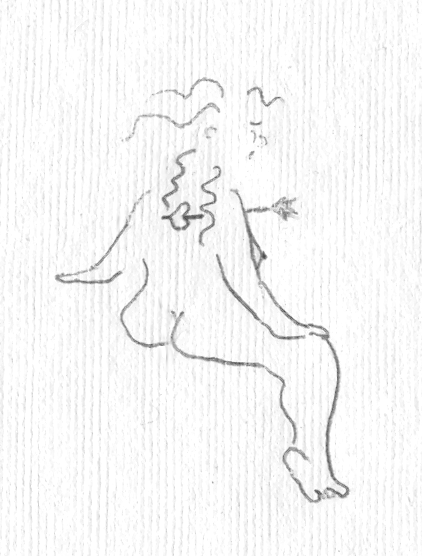Why so far from your path my little man? Rest your head in my bosom Lay your tears upon Mother Earth Take sustenance from my teat Be my lover for a time Time for your medical training Time to build roads and buildings and fascinating devices of engineering My, so busy Not too busy To dance and play guitar and sing with a gathering every evening In knowing celebration of harvested humanity Tasty food from the hearth Long discussions of politics and mirth One day your hairy legs will itch Your hooves tap and your tail twitch One evening you’ll silently fade back to me To coax budding women into the forest and sow boldness in them so generation after generation humans in wilderness and wilderness in humans
Author: Dave
Spring at Dusk
I close my door on the descending darkness A smile gently clings to the afterglow of youth’s sun–soaked pageantry Lonely eyes take in their new surroundings tired limbs prepare to embrace the night The incessant call of a solitary nightingale sings so close to despair as innocent as a heartbeat
Beloved (Read by the Author)
One never expects love She always descends in such inappropriate places Soft, dulcet–smooth some kind, caramel–honey Pouring into my ears So low–down every murderous word tender I bike against the flow of traffic futilely thumbing for her to raise her voice cursing the onslaught of society
About Time for Rain
The first time I allowed myself to see beauty in every being was the first time the universe smiled upon me in the knowing smile of a woman I stopped planting my feet to steady my bike as she crossed the street the air applauding with a chorus of strings from a idle car’s stereo I gazed she pondered, puzzled then she saw and smiled knowing
Bogart and Brando in the Bathroom
Bogart is being interviewed by Brando in a bathroom.
He tells Brando, “Careful not to get pooh on my suit”
Brando lays Bogart’s suit across the toilet seat. In a quiet gesture of menace, he gently presses it down. One tiny spot of pooh touches the breast pocket.
Enraged, Bogart manhandles Brando: he stuffs him in the toilet and flushes him down. You can here the explosion of pipes downstairs in the busy kitchen.
Bogart and his compadre are outside, about to take off. They debate whether to kill “stupid”, referring to me, for getting Brando to do that to the suit.
Travel Advice
Avoid the travel agent’s hellish destination Thank God for the angel’s abundant journey
Stroking, Dancing
Flower strokes its petal
Asks “Who am I?”
The sky and the earth dance
Roots feed petals
petals feed roots
Gasp, Sigh
I cry, acknowledging each must face their pain as natural as the rain dripping leaf to branch to root drowsy, heavy, tip-tap (Gasp) touching my innermost part Heart-pleasure piercing through dissolving, corroding (ah: oo) wondrous (pain)
Nude with Arrow

Zen in the Art of Archery
A short and sweet retelling of being a student of archery while in Japan teaching philosophy.
For years, students practice various stages of drawing back, holding, and releasing bow and arrow. All of this conscious practice is preparation and subconscious training for real advancement: spiritual moments drawing the student ever closer to becoming one with the target. The master patiently observes the students as they progress through their failing. Only after the student has become lost for options is it the serendipitous time to drop a bit of wisdom in the student’s ear.
The wisdom is spiritual in nature. There is always one theme: losing the self in purposelessness so that it may fire.
Day by day I found myself slipping more easily into the ceremony which sets forth the “Great Doctrine” of archery, carrying it out effortlessly or, to be more precise, feeling myself being carried through it as in a dream. Thus far the Master’s predictions were confirmed. Yet I could not prevent my concentration from flagging at the very moment when the shot ought to come. Waiting at the point of highest tension not only became so tiring that the tension relaxed, but so agonizing that I was constantly wrenched out of my self−immersion and had to direct my attention to discharging the shot.
“Stop thinking about the shot!” the Master called out. “That way it is bound to fail.”
“I can’t help it,” I answered, “the tension gets too painful.”
“You only feel it because you haven’t really let go of yourself.
“It is all so simple. You can learn from an ordinary bamboo leaf what ought to happen. It bends lower and lower under the weight of snow. Suddenly the snow slips to the ground without the leaf having stirred. Stay like that at the point of highest tension until the shot falls from you. So, indeed, it is: when the tension is fulfilled, the shot must fall, it must fall from the archer like snow from a bamboo leaf, before he even thinks it.”
One time, after long frustration at not getting the thumb to release gracefully, our professor calculates a technique to advance. On seeing the technique, the master turns away, disheartened: only after repeated protestations does he allow the professor back into his tutelage.
Years of conscious effort only to let go so that the unconsciously-guided self execute fully engaged in the moment.
Echoes of the surrender theme of religions and self-help; echoes of Jung’s development of the primary function (example: consciousness) followed by development and integration of the secondary function (example: unconsciousness).